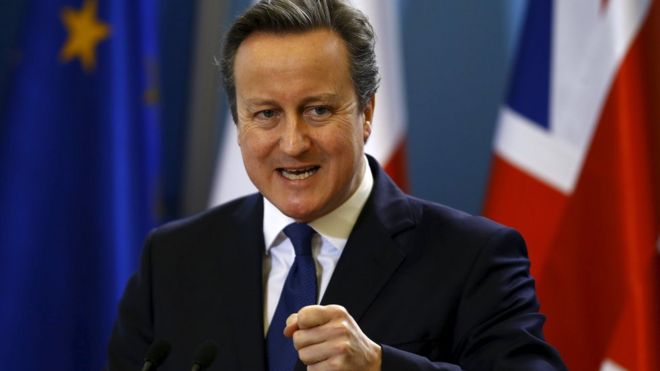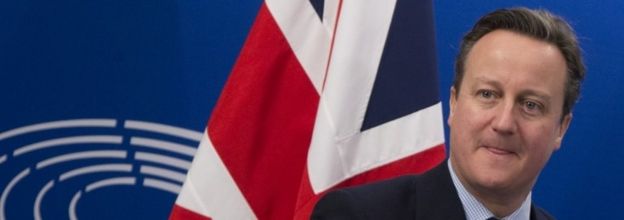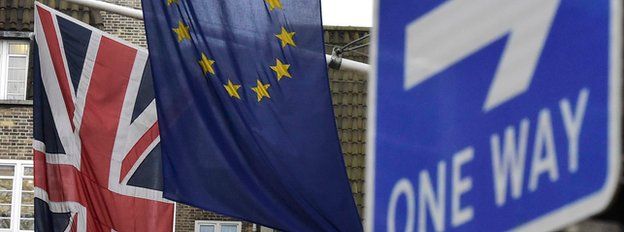
David Cameron’s bid to win backing for his EU reforms has reached “crunch time”, a UK government official says.
The prime minister heads for a Brussels summit later hoping to agree a deal on changes that will pave the way for the UK’s in/out referendum.
It follows months of negotiations between officials, with the PM visiting 20 member states to make his case.
EU Council President Donald Tusk told the BBC leaders had “no choice” but to agree a deal at the two-day summit.
Campaigners for a UK exit from the EU have dismissed the draft reforms as trivial, saying the only way to achieve change is to vote to leave.
In his official invitation to the gathering, Mr Tusk said there was “no guarantee” a deal would be reached, with “difficult” differences remaining on key issues.
He said the negotiations were at a “very advanced” stage and failure now “would be a defeat both for the UK and the European Union, but a geopolitical victory for those who seek to divide us”.
Following a phone call between Mr Cameron and Mr Tusk late on Wednesday, a Downing Street spokesman said they had “agreed that good progress had been made… and that the draft texts presented a good basis for agreement at tomorrow’s European Council, subject to the satisfactory resolution of outstanding issues”.
‘Live negotiations’
The UK’s renegotiation is the first item on the agenda in Brussels, with the leaders also due to discuss the migration crisis.
The leaders would return to the UK issue on Friday morning, Mr Tusk said, as they searched for a “legally binding and irreversible agreement”.
Their talks will be based on the draft proposals he published earlier this month, taking into account “technical and legal clarifications” since added by negotiating teams.
The proposals include restrictions on migrants’ in-work benefits, which have been resisted by a number of Central European countries, and protections for countries outside the eurozone which France is said to have opposed.
However, German Chancellor Angela Merkel has said most of Mr Cameron’s demands are “justified and necessary”.
Analysis

By Laura Kuenssberg, BBC political editor
How on earth did the man who once accused the Conservatives of being out of touch for “banging on about Europe”, get himself into a position where he has already been “banging on about Europe” for months and months, and will spend the next four months still doing precisely that?
Most simply, as the years have passed, his party has changed.
As the EU expanded, and generations of MPs came and went, a soft scepticism towards the European project, neither full-throated support, nor hardcore opposition, became more common, and sympathy for the idea of a referendum spread from the margins.
The eurozone financial crisis, and the EU’s stumbling approach to sorting it out, gave a fresh energy to eurosceptic MPs who wanted to campaign to leave.
In part that apathy, if not downright dislike, towards the EU spread because of the enormous rise in the numbers of people from around the Union who came to live and work in the UK.
Numbers that took the political establishment completely by surprise began to arrive from the moment new countries like Poland joined the EU in 2004.
It was that steep rise in EU immigration that gave David Cameron his most pressing political reason for – in the end – promising a referendum.
- Read more from Laura: How did Cameron end up here?
- Chris Morris: Deal in reach, but much could go wrong
Mr Cameron is seeking key changes on European integration, business competiveness, benefits restrictions and the operation of the eurozone.
Speaking on the eve of the summit, a UK government official told BBC deputy political editor James Landale that the eurozone and welfare reform aspects were yet to be resolved, as was the question of whether the reforms would be written into the EU’s binding treaties.
On welfare, the official expected the focus to be on the “emergency brake” that would restrict EU migrants’ welfare entitlement for four years, and a bid to reduce child benefit claims for children living overseas.
“These are live negotiations,” the official added.
“We are at a sensitive point. The PM will be going to the Council battling hard on all of these issues that matter so much to the British people.”
EU Out campaigners say the draft reforms will make no difference to the number of migrants coming to Britain and will not allow the UK to block unwanted EU laws.
What happens next?

Thursday:
15:00 GMT (16:00 local): EU leaders begin arriving for their regular summit at the European Council headquarters in Brussels
16:45: First working session on the UK proposed reforms
19:00: Working dinner on the migration crisis
Talks on the UK deal could resume after dinner and continue late into the night, if there is still no deal
Friday:
08:00: Discussions will continue over an “English Breakfast” if no agreement on the UK demands has been reached on Thursday
If David Cameron gets a deal, he will hold an emergency cabinet meeting on Friday evening to reach an agreed position on remaining in the EU, although ministers will be free to campaign against that in a personal capacity
Mr Cameron may then announce the date of the UK’s referendum, although he does not have to do so
17 March:
The next scheduled EU summit – at which Mr Cameron could have another chance to get a deal. There has also been talk of a special summit at the end of February
Thursday 23 June:
Still seen as the most likely date of a UK referendum if Mr Cameron gets a deal in February or March, but he has until the end of 2017 to hold one
UK and the EU: Better off out or in?
If a deal is reached, Mr Cameron is expected to brief his cabinet on Friday, which will free ministers to campaign for either side in the referendum. Thursday 23 June is seen as the most likely date for the poll.
The PM says his goal is to campaign to stay in a reformed European Union.
Alongside his EU reform talks, Mr Cameron is working on a separate plan to boost UK sovereignty aimed at getting sceptical Tories, including Boris Johnson, to get behind his reform deal.
Details of this project have yet to be revealed.
On the migration crisis, which will be discussed at a working dinner on Thursday evening, Mr Cameron is expected to say the government is preparing to send a second UK Border Force cutter vessel to the Mediterranean to help Turkey tackle the flow of refugees attempting to cross the water to Greece.
BBC
 Q FM Africa's Modern Radio
Q FM Africa's Modern Radio